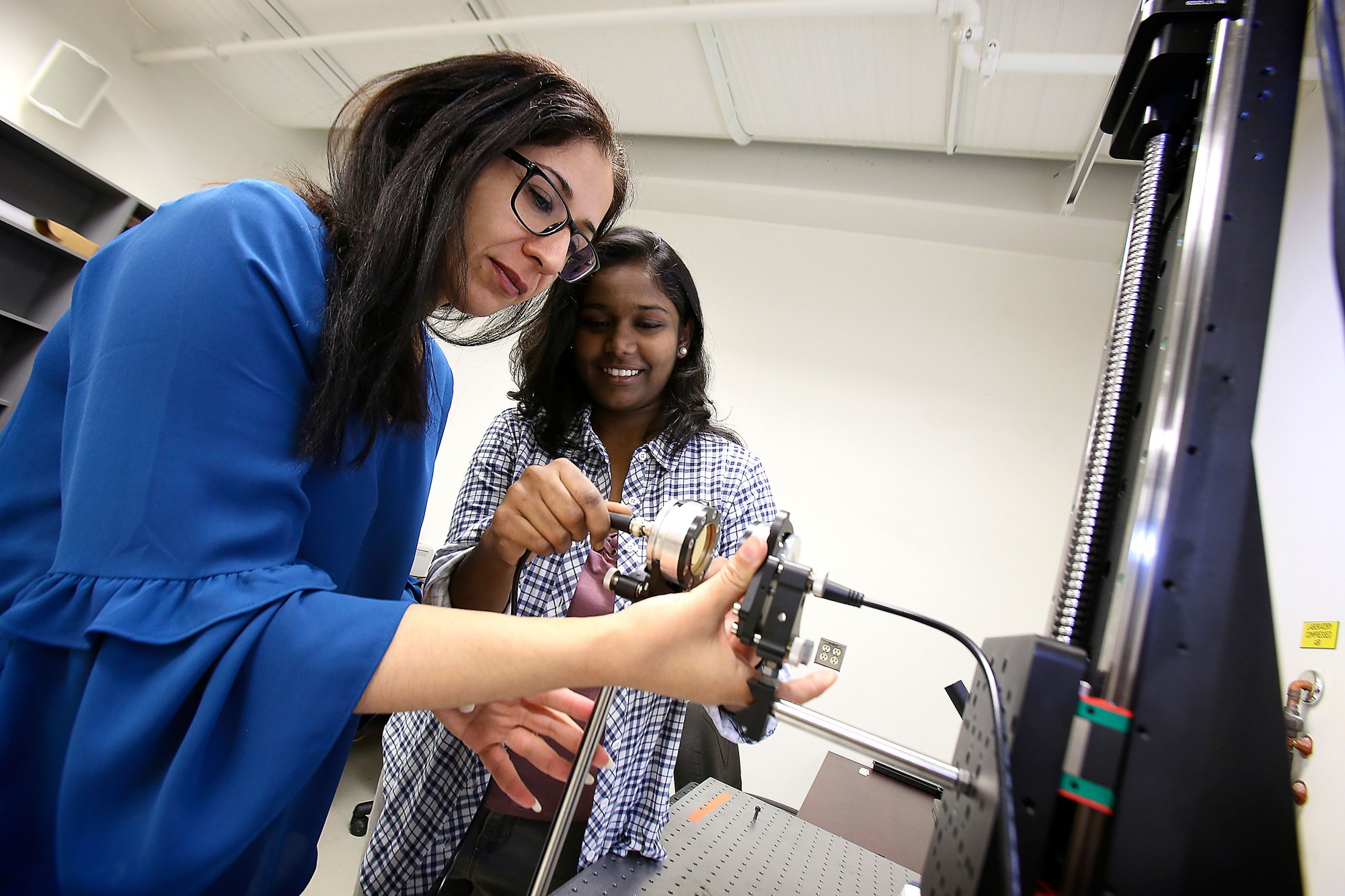 Dr. Arezoo Emadi and Jenitha Balasingam, a graduate student who works with Emadi in the Electrical Micro & Nano Devices and Sensors Research Centre (e-Minds), adjust an ultrasonic imaging system for cancer detection.
Dr. Arezoo Emadi and Jenitha Balasingam, a graduate student who works with Emadi in the Electrical Micro & Nano Devices and Sensors Research Centre (e-Minds), adjust an ultrasonic imaging system for cancer detection.
What if family doctors had access to low-cost, handheld scanners or biosensors that could detect cancer at an early stage? What if they could monitor a patient’s heart activity through a wearable device and detect early signs of cardiovascular disease? How about a sensor that could prevent intoxicated drivers from operating vehicles or a navigation system that could aid the visually impaired indoors?
Researchers at the University of Windsor hope to advance these technologies and more in Windsor’s first state-of-the-art microfabrication facility. The high-tech clean room will be specially designed to facilitate multidisciplinary micro- and nano-scale research by controlling air pollutant levels, pressurization, temperature and humidity. It’s slated to open in 2019 in the Ed Lumley Centre for Engineering Innovation.
“This fabrication facility will provide us with an ideal incubator for academia and industry to foster collaborative research and commercialization of advanced sensors, thus increasing our leadership in the emerging area of the micro nano sensor industry — an area which is rapidly growing,” says Dr. Jalal Ahamed, an assistant mechanical engineering professor who designs and fabricates micro- and nano-systems for a variety of applications, including healthcare, automotive, aerospace and manufacturing.
“More and more devices are becoming smaller and smarter, so there is an increased need for finding innovative and cost- effective ways to miniaturize these sensors.”
Local companies have already shown interest in commercializing Ahamed’s personalized navigation system for the visually impaired and those in low- visibility environments. Unlike most navigation systems, which rely on a GPS satellite signal, Ahamed’s wearable smart device uses motion and acoustic wave sensors to detect nearby objects — the same way bats use sound waves to navigate.
Dr. Arezoo Emadi is an assistant professor in electrical engineering who works on biosensors and smart sensor systems for medical and environmental applications. She says her work in biomedical engineering is driven by a common element.
“Regardless of the disease type, survival rates are associated with a noticeable defining factor — the availability of low-cost and effective early detection and diagnostic tools,” Emadi says.
“Therefore, our research team in the Electrical Micro & Nano Devices and Sensors Research Centre (e-Minds) focuses on developing innovative techniques for health monitoring applications as well as diagnostic tools. Our aim is to facilitate cost-effective and more accessible secondary preventive strategies.”
Emadi believes the clean room brings micro- and nano-fabrication capabilities in-house that will not only be highly beneficial for faculty and students at the University of Windsor but for researchers across Canada as the facility can support a wide range of cross-disciplinary biomedical research activities.
“It will also help us branch out and establish connections with new industry sectors,” says Emadi.
Researchers must wear clean room suits while working in the lab to prevent skin and hair from contaminating results. An environment free of particles is critical when designing biosensors such as Emadi’s devices that can detect breast cancer at an early stage, targeted biomarkers of lung cancer and intoxicated drivers or bacteria in greenhouse vegetables.
Emadi hopes these biosensors can one day assist police during roadside tests and prevent intoxicated driving, help doctors detect and treat cancer at an early stage, or prevent consumption of unsafe and contaminated foods. Her research spans campus and includes colleagues who specialize in chemistry, biochemistry and physics, in addition to electrical and mechanical engineering.
Dean Mehrdad Saif says the new facility will help faculty and student researchers make important contributions to the Internet of Things (IoT) and practical, real-world problems.
“Design, development and fabrication of miniaturized, low power microsystems will be critical for further development of IoT and hence, a move towards a highly connected world where devices at our home, industries and in our cars can communicate and share information with one another.”
This article is featured in the 2018 issue of Windsor Engineering (WE).
